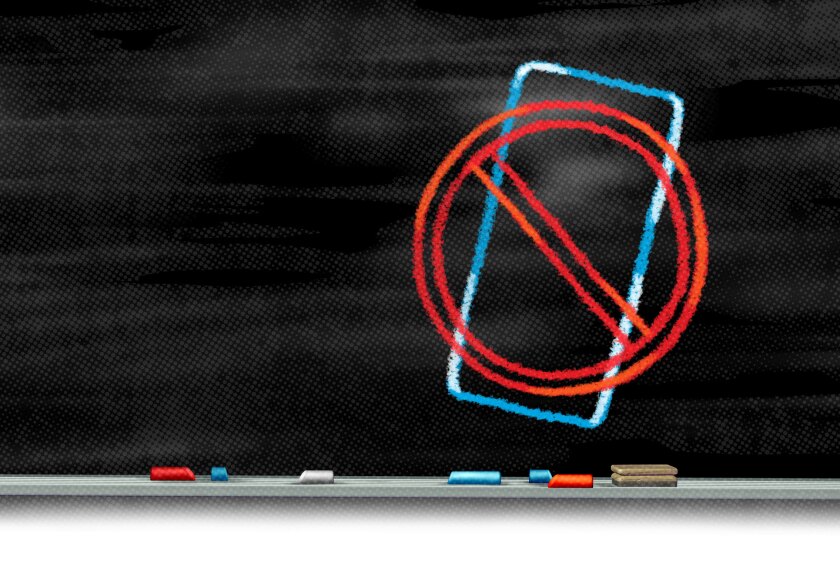More districts and states are putting restrictions on when and how students can use their cellphones during the school day for the benefit of their learning and mental health.
That trend has led some people to wonder if schools should also have policies in place for teachers so they can model appropriate behavior for students, especially as kids find ways to dodge the restrictions.
“Teachers, as professionals, should model a balanced and intentional approach to using their phones during the school day,” said Edward Rivero, a visiting assistant professor at Teachers College, Columbia University, whose research examines digital literacy. “When phone use is not directly tied to pedagogy or student engagement, teachers should use discretion and ensure their behavior aligns with the expectations of the school rules and standards.”
It’s unclear how many districts across the country have explicit policies on teachers’ cellphone use.
Education Week asked its audience, in an informal LinkedIn poll, what cellphone policy their school or district has for teachers: More than a third of the 694 respondents (37 percent) said their school/district policy is that teachers are not allowed to use their cellphones at all during school hours, 31 percent said teachers can use their phones between classes, and 20 percent said teachers can use their phones only for emergencies.
Clear guidelines might help model appropriate use for students
Principals and teachers who spoke with Education Week agree that adults should be modeling appropriate cellphone use for students, but it’s not—and doesn’t always need to be—an explicit, written policy. It’s more of a professional expectation, they said.
Still, it might be helpful to have clear guidelines and shared understanding within a school to maintain consistency and accountability, Rivero said.
Social studies teacher Manuel Rustin said there’s not a schoolwide or districtwide policy on student cellphone use at John Muir High School Early College Magnet in Pasadena, Calif., so every teacher has their own set of classroom rules. (By July 2026, every district in California is required to adopt a policy on student cellphone use, per a law signed by Gov. Gavin Newsom in September.)
So far, there have not been any discussions in his school district about crafting policies around teachers’ cellphone use, Rustin said. But he makes sure he follows any rules he wants his students to adhere to.
Rustin collects students’ phones at the start of every class by handing out envelopes for students to place their devices in, and he has told students to “‘make sure I’m not on my phone’ because it would be unfair for me to not adhere to a policy that I’m asking them to adhere to,” he said.
“As professionals, we should not be using our phones for anything that’s not directly teaching-related,” Rustin said. He keeps his phone away in his desk drawer and usually only looks at it during lunch.
Using cellphones for schoolwide communication makes restrictions impractical
Some schools communicate with teachers through their cellphones, according to educators. For instance, at Boyd Elementary School in Boyd, Texas, Principal Jana Clark said it’s often easier to call teachers on their cellphones if they need an extra hand during recess or in the lunchroom.
“My teachers are fabulous—they’re rarely at their seats,” Clark said. “They do have a classroom phone, but if they’re in their classroom, a lot of times they miss it because they’re not at their desk—they’re walking around, actively monitoring.”
Boyd Elementary also has a panic-button app that’s available on teachers’ cellphones that they can use to alert the rest of the school and emergency responders if there’s an incident. As a result, it would be difficult to have restrictions on teachers’ cellphone use, Clark said.
“We also have to recognize that [teachers] have lives, too,” she said, recalling a time one of her teachers had to answer a cellphone call from her daughter’s school about a medical emergency. “It’s important to recognize that they’re professionals. I have never walked into a classroom and a teacher was on a cellphone.”
Teachers also often don’t have the time to dilly dally on their phones, educators said.
“I don’t use my phone at any point during class,” said Natalie Markey, a math teacher at Lake Braddock Secondary School in Burke, Va. “I’m honestly too busy.”
At her school, students are only allowed to use their phones between classes, so that’s also when Markey said she checks hers to see if there’s anything urgent. Otherwise, her phone stays in her backpack unless she’s going to lunch or to a long meeting.
“Any sort of blanket policy would need to have some room for [teachers’] professional discretion and the trust that [administrators] have in the teachers to do their job,” she said.









